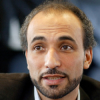Tariq Ramadan

Tariq Ramadan
Tariq Ramadanis a Swiss academic, philosopher and writer. He is the professor of Contemporary Islamic Studies in the Faculty of Oriental Studies at St Antony's College, Oxford and also teaches at the Oxford Faculty of Theology. He is a visiting professor at the Faculty of Islamic Studies, the Université Mundiapolisand several other universities around world. He is also a senior research fellow at Doshisha University. He is the director of the Research Centre of Islamic Legislation and Ethics, based in...
NationalitySwiss
ProfessionWriter
Date of Birth26 August 1962
CountrySwitzerland
This simple truth is the essence of my message to Muslims throughout the world: know who you are, who you want to be, and start talking and working with whom you are not. Find common values and build with fellow citizens a society based on diversity and equality.
"If we had not created a set of people against another the world would have been corrupt", and "against" here means two things: Against in the fact that they are challenging you with their diversity, challenging your intelligence and to challenge is not negative, it can be very positive depending on how you are challenged.
To live is to love,to serve, to forgive. Love the One, love and serve humanity. To learn to love oneself and to love is to learn to forgive
I opposed the Fatwa against Salman Rushdie. I read the book and took a critical distance. I did not think The Satanic Verses is a blasphemous book. I did not consider the book as being a great read, but as an intellectual I read, I assess, and I respond. I make a difference between true freedom of expression to which we owe a response and provocation, which we ignore.
Humility is my table, respect is my garment, empathy is my food and curiosity is my drink. As for love, it has a thousand names and is by my side at every window.
A true teacher doesn't teach you to think like him, but to think without him.
There is a claim coming from the West that says that all art must be outside any moral consideration. I can understand this as a provocation, but I also believe that we can still have very profound creativity with a moral sense.
Compelling a woman to wear a headscarf is against Islam, and compelling her to remove it is against human rights.
Your sensitivity is power. Don't let people transform your qualities into weaknesses.
If you read the Qur'an with your head, you find repetition. If you read it with your heart, you find depth.
I think what we are seeing is a vicious circle: by covering the controversies and the conflicting realities, it creates a much distorted perception of Islam and Muslims. When a minority is being taken as a majority, it creates a wrong image.
One does not always know how to express the sorrow of the soul. One does not always know how to silence the joy of the heart.
Islam doesn't need reform, we need to reform the Muslim mind.
I look to Islamic ethics to find something that can provide the basis for shared values with other traditions, and ultimately universal values. This ties into the point I made in a book, The Quest for Meaning, that the only way for values to be universal is if they are shared universal values. My main point is, in this quest for value the aim is not to express your distinctness from others, but about being able to contribute to the discussion of universal value.